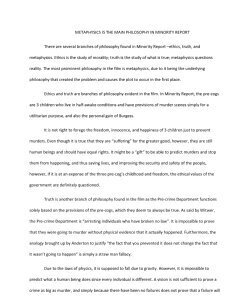Metaphilosophy Metaphilosophy relies on the idea that it might be productive to distinguish some general pronouncements about philosophy from philosophy itself. Contrasting with many other cultural pr
Metaphilosophy Metaphilosophy relies on the idea that it might be productive to distinguish some general pronouncements about philosophy from philosophy itself. Contrasting with many other cultural pr
Metaphilosophy relies on the idea that it might be productive to distinguish some general pronouncements about philosophy from philosophy itself. Contrasting with many other cultural practices, for philosophy the distinction is rather questionable, but a similar case is presented by language: when speaking in English about the English language one might assume a split between English-as-object and English-as-metalanguage. Philosophers using the term metaphilosophy being still a minority, it might be surmised that the majority does not consider the idea worth exploring. As far as it is a reflexive practice philosophy always already incorporates its own considering e.g. by appealing to its own tradition, to its opponents or to its history; thus, historicist philosophies, such as Hegel's, are metaphilosophies without mention of the term. A synchronic or systemic approach is a more obviously 'metaphilosophically' than a historic or a diachronic one.
Wittgenstein famously rejected the analogy between metalanguage and a metaphilosophy:
"One might think: if philosophy speaks of the use of the word "philosophy" there must be a second-order philosophy. But it is not so: it is, rather, like the case of orthography, which deals with the word "orthography" among others without then being second-order."[1]
Recently Timothy Williamson has refrained from using the word and expressed concern that it might be misleading:
"I also rejected the word “met philosophy.” The philosophy of philosophy is automatically part of philosophy, just as the philosophy of anything else is, whereas met philosophy sounds as though it might
